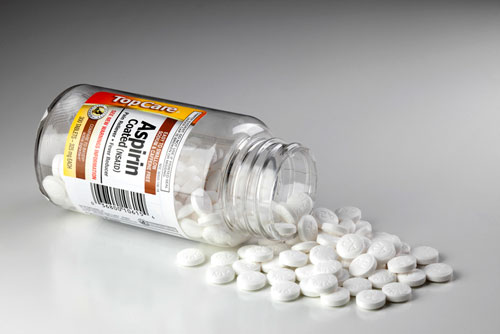Daily aspirin does more harm than good in most people.
That’s the blunt message from Harvard doctors after a major new review. Some 29 million Americans take daily aspirin for heart health. But for the vast majority, aspirin is more likely to cause internal bleeding that leads to a stroke than it is to prevent a heart attack, the authors concluded. [1]
For years, mainstream doctors encouraged practically anyone with the slightest indication of potential heart disease to take a daily low-dose aspirin. But three major studies in the last year have shown that was a big mistake.
It turns out that the risk of bleeding outweighs any heart benefit in most cases.
Almost half of people over age 70 without a history of heart disease are taking daily aspirin, the review found. That included many people with peptic ulcer disease. That’s a condition that should preclude aspirin use. None of these people should be taking daily aspirin, the report said.
The American Heart Association has pushed aspirin for decades. But after the Harvard report, it has reversed itself. It now recommends against aspirin for people over 70…and also for those with increased bleeding risk who don’t have heart disease.[2]
Dr. Christina Wee was the new study’s lead author. She said the findings suggest a lot of adults “may be taking aspirin without their physician’s advice and potentially without their knowledge.”
Coauthor Dr. Stephen Juraschek urges people who are taking daily aspirin to “discuss it with your doctor to see if it is still needed for you.”
5 Ways to Lower Heart Disease Risk Without Aspirin
There are science-backed steps you can take to avoid heart disease. None of them involve taking aspirin or any other drugs…
1. High-intensity interval training. It’s the best form of exercise for your heart. Just two minutes of HIIT gives you the benefits of a half hour of conventional jogging or biking. Go here to find out how to do it.
2. Mindfulness meditation. Studies show a link between stress and heart issues. Mindfulness meditation is a natural technique that reduces anxiety. You can learn to do it here.
3. Rutin. This is a plant pigment. It relaxes blood vessel walls. This prevents plaque buildup. It has the blood-thinning effects of aspirin without causing bleeding.[3]
Rutin is found in apple skin. Eating one red apple a day gives you the amount you need. You can also get rutin in supplement form.
4. Krill oil. Omega-3 fatty acids in fish oil supplements reduce inflammation, one of the main risk factors for heart disease.
But krill oil is over 10 times more powerful than regular fish oil. Studies find that just 300 mg each day can reduce inflammation by over 30% in a month.[4]
5. Berries. They’re high in fiber, full of vitamins, and fight heart disease. Berries contain powerful antioxidant compounds call anthocyanins. They have been shown to lower cholesterol and blood pressure.[5] [6]
Berries high in anthocyanins include blackberries, blueberries, and raspberries. You can get a good amount of it from red wine too.
Editor’s Note: Independent Healing is your best source for unbiased, evidence-based medical information. To find out more, go HERE.
Related Articles
Should You Take a Daily Aspirin?
Aspirin Worse Than We Thought…
[1]https://www.ncbi.nlm.nih.gov/pubmed/31330542
[2]https://www.eurekalert.org/pub_releases/2019-07/bidm-rfw071819.php
[3]http://www.healthline.com/health/potential-benefits-of-rutin#prevents-blood-clots3
[4]http://www.ncbi.nlm.nih.gov/pubmed/17353582
[5]http://institutefornaturalhealing.com/2013/08/this-colorful-antioxidant-lowers-blood-pressure/
[6] https://www.verywellhealth.com/the-scoop-on-anthocyanins-89522

